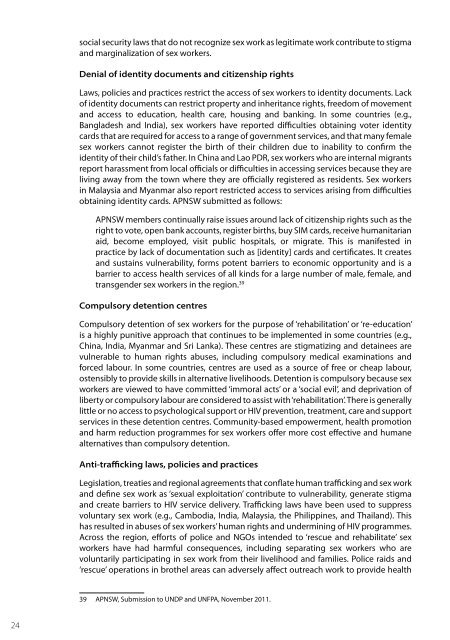SEX WORK AND THE LAW - HIV/AIDS Data Hub
SEX WORK AND THE LAW - HIV/AIDS Data Hub
SEX WORK AND THE LAW - HIV/AIDS Data Hub
Create successful ePaper yourself
Turn your PDF publications into a flip-book with our unique Google optimized e-Paper software.
social security laws that do not recognize sex work as legitimate work contribute to stigma<br />
and marginalization of sex workers.<br />
Denial of identity documents and citizenship rights<br />
Laws, policies and practices restrict the access of sex workers to identity documents. Lack<br />
of identity documents can restrict property and inheritance rights, freedom of movement<br />
and access to education, health care, housing and banking. In some countries (e.g.,<br />
Bangladesh and India), sex workers have reported difficulties obtaining voter identity<br />
cards that are required for access to a range of government services, and that many female<br />
sex workers cannot register the birth of their children due to inability to confirm the<br />
identity of their child’s father. In China and Lao PDR, sex workers who are internal migrants<br />
report harassment from local officials or difficulties in accessing services because they are<br />
living away from the town where they are officially registered as residents. Sex workers<br />
in Malaysia and Myanmar also report restricted access to services arising from difficulties<br />
obtaining identity cards. APNSW submitted as follows:<br />
APNSW members continually raise issues around lack of citizenship rights such as the<br />
right to vote, open bank accounts, register births, buy SIM cards, receive humanitarian<br />
aid, become employed, visit public hospitals, or migrate. This is manifested in<br />
practice by lack of documentation such as [identity] cards and certificates. It creates<br />
and sustains vulnerability, forms potent barriers to economic opportunity and is a<br />
barrier to access health services of all kinds for a large number of male, female, and<br />
transgender sex workers in the region. 39<br />
Compulsory detention centres<br />
Compulsory detention of sex workers for the purpose of ‘rehabilitation’ or ‘re-education’<br />
is a highly punitive approach that continues to be implemented in some countries (e.g.,<br />
China, India, Myanmar and Sri Lanka). These centres are stigmatizing and detainees are<br />
vulnerable to human rights abuses, including compulsory medical examinations and<br />
forced labour. In some countries, centres are used as a source of free or cheap labour,<br />
ostensibly to provide skills in alternative livelihoods. Detention is compulsory because sex<br />
workers are viewed to have committed ‘immoral acts’ or a ‘social evil’, and deprivation of<br />
liberty or compulsory labour are considered to assist with ‘rehabilitation’. There is generally<br />
little or no access to psychological support or <strong>HIV</strong> prevention, treatment, care and support<br />
services in these detention centres. Community-based empowerment, health promotion<br />
and harm reduction programmes for sex workers offer more cost effective and humane<br />
alternatives than compulsory detention.<br />
Anti-trafficking laws, policies and practices<br />
Legislation, treaties and regional agreements that conflate human trafficking and sex work<br />
and define sex work as ‘sexual exploitation’ contribute to vulnerability, generate stigma<br />
and create barriers to <strong>HIV</strong> service delivery. Trafficking laws have been used to suppress<br />
voluntary sex work (e.g., Cambodia, India, Malaysia, the Philippines, and Thailand). This<br />
has resulted in abuses of sex workers’ human rights and undermining of <strong>HIV</strong> programmes.<br />
Across the region, efforts of police and NGOs intended to ‘rescue and rehabilitate’ sex<br />
workers have had harmful consequences, including separating sex workers who are<br />
voluntarily participating in sex work from their livelihood and families. Police raids and<br />
‘rescue’ operations in brothel areas can adversely affect outreach work to provide health<br />
39 APNSW, Submission to UNDP and UNFPA, November 2011.<br />
24
















